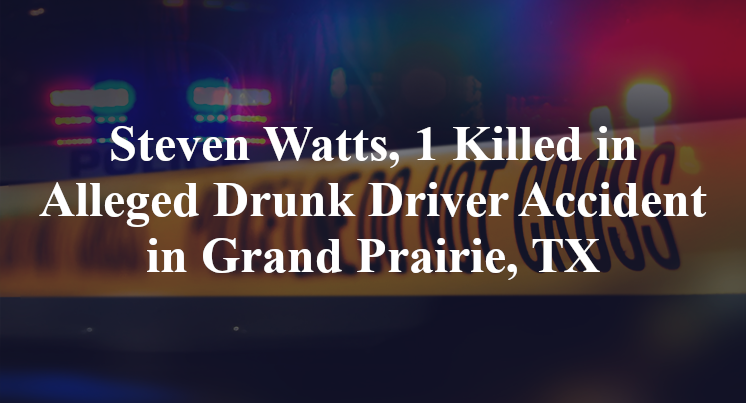Steven Watts, 1 Killed in Alleged Drunk Driver Accident in Grand Prairie, TX
UPDATE (April 23, 2025): Additional reports have been released which state that the person who had been behind the wheel of the Nissan was apparently under the influence of alcohol at the time of the wreck. The investigation remains underway.
UPDATE (January 14, 2025): Recent reports have been released which identify one of the men who lost their lives as a result of this accident as 27-year-old Steven Watts. No additional information is currently available. Investigations continue.
Grand Prairie, TX — January 13, 2025, two people were killed in a car accident at approximately 4:00 a.m. along the Interstate Highway 30 frontage road.
According to authorities, one person was traveling in a westbound Nissan on the I.H. 30 frontage road while another person was traveling in a southbound Dodge pickup truck on the S.H. 161 service road when the accident took place.

The cause of the accident remains unclear. The intersection is apparently controlled by a traffic signal. Officials state that, for as yet unknown reasons, the Nissan failed to stop for the red light indicated by the signal. This resulted in a collision between the two vehicles within the intersection.
The two people who had been behind the wheels of the vehicles reportedly suffered fatal injuries over the course of the accident and were declared deceased at the scene. No other injuries have been reported. Additional details pertaining to this incident—including the identities of the victims—are not available at this point in time. The investigation is currently ongoing.
Commentary by Attorney Michael Grossman
When someone runs a red light and causes a deadly crash, the immediate focus tends to be on the violation itself. But when it later comes to light that the driver may have been under the influence of alcohol, it’s worth stepping back to ask a broader question: how did that driver end up in a position to take the wheel in that condition?
In many drunk driving crashes, the story ends with a police report and a toxicology result. But that leaves out an essential part of the picture—where the alcohol came from, and whether the person who provided it followed the law.
Texas dram shop law prohibits alcohol providers from serving someone who is obviously intoxicated. When they do, and that person causes a serious or fatal crash, the provider may share legal responsibility for the harm that follows. These laws exist to reinforce the idea that keeping roads safe is a shared responsibility—not just for drivers, but also for those who serve them.
In my experience, overservice rarely happens by accident. Bars and restaurants that break the rules often serve patrons well past the point where the signs of impairment are impossible to ignore. That kind of conduct puts lives at risk, especially when it ends with someone speeding through an intersection at four in the morning.
Unfortunately, investigations into where the driver had been drinking are often overlooked. That can mean missing a chance to hold every responsible party accountable—and missing an opportunity to prevent the next crash before it happens.
From where I sit, families affected by a crash like this deserve the full story. Figuring out where the driver was drinking is one of the most important steps we can take to help them get answers—and to ensure real accountability.

*We appreciate your feedback and welcome anyone to comment on our blog entries, however all visitor blog comments must be approved by the site moderator prior to showing live on the site. By submitting a blog comment you acknowledge that your post may appear live on the site for any visitors to see, pending moderator approval. The operators of this site are not responsible for the accuracy or content of the comments made by site visitors. By submitting a comment, blog post, or email to this site you acknowledge that you may receive a response with regard to your questions or concerns. If you contact Grossman Law Offices using this online form, your message will not create an attorney-client relationship and will not necessarily be treated as privileged or confidential! You should not send sensitive or confidential information via the Internet. Since the Internet is not necessarily a secure environment, it is not possible to ensure that your message sent via the Internet might be kept secure and confidential. When you fill out a contact or comment form, send us an email directly, initiate a chat session or call us, you acknowledge we may use your contact information to communicate with you in the future for marketing purposes, but such marketing will always be done in an ethical way.